|
|
|
Sort Order |
|
|
|
Items / Page
|
|
|
|
|
|
|
| Srl | Item |
| 1 |
ID:
115617


|
|
|
| 2 |
ID:
117077


|
|
|
|
|
| Publication |
2012.
|
| Summary/Abstract |
The Democratic Party of Japan (DPJ) came to power in 2009 promising significant transportation sector reform, but it has struggled to implement its proposals. I argue that the DPJ's initiatives faltered due to the legacy of "efficiency clientelism." Historically, Japanese transportation policy combined two imperatives: (1) encourage efficiency by raising the cost of energy-inefficient transportation, and (2) redistribute benefits to supporters of the incumbent Liberal Democratic Party (LDP). Because of the legacy of efficiency clientelism, DPJ campaign pledges-designed to appeal broadly to the general public by reducing transportation costs- ran up against the prospect of sharp declines in revenues and energy efficiency. Efficiency clientelism was well suited to political realities in Japan prior to the 1990s, but recent developments have undercut its viability. This raises profound questions about the sustainability of Japan's energy efficiency achievements.
|
|
|
|
|
|
|
|
|
|
|
|
|
|
|
|
| 3 |
ID:
118417


|
|
|
|
|
| Publication |
2013.
|
| Summary/Abstract |
In this article, we address four common, often contradictory misconceptions concerning Japanese foreign and security policy. First, Japan's strategic "normalization" is dangerous. Second, Japan is incapable of having a "normal" policy. Third, Japan is about to become "normal." Fourth, foreign and security policy under the Democratic Party of Japan (DPJ) will differ radically from what it was for fifty years under the Liberal Democratic Party (LDP). We contend that Japan is not a threat; that it has a security policy, but not one that fits well with Western models; and that Japan's security policy is changing, gradually not radically, and is not becoming just like the West's.
|
|
|
|
|
|
|
|
|
|
|
|
|
|
|
|
| 4 |
ID:
117076
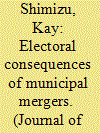

|
|
|
|
|
| Publication |
2012.
|
| Summary/Abstract |
The dominance of Japan's Liberal Democratic Party (LDP) was long buttressed by the existence of a strong political support base in the rural areas led by local politicians who worked on behalf of national LDP politicians seeking reelection. In recent years, municipal mergers have drastically weakened the LDP's support base by reducing the number of local politicians and redrawing electoral district boundaries. Surprisingly, the main opposition party, the Democratic Party of Japan (DPJ), could not take full advantage of these new institutional arrangements. Instead, local politicians have become more independent of both major parties. As a result, at a time of increasing numbers of floating voters, neither of Japan's two major parties has a reliable local base across the country. To succeed, both parties must pay attention to the changing needs of the increasingly independent-and very often still rural-localities.
|
|
|
|
|
|
|
|
|
|
|
|
|
|
|
|
| 5 |
ID:
100580


|
|
|
|
|
| Publication |
2010.
|
| Summary/Abstract |
This study seeks to identify the factors that caused the historic defeat of Japan's longdominant party in the 2009 election. Employing district-level data, I show that a large national swing occurred that overrode district-specific characteristics, and that the electoral coordination of opposition parties helped bring about victory.
|
|
|
|
|
|
|
|
|
|
|
|
|
|
|
|
| 6 |
ID:
126845
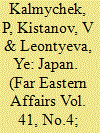

|
|
|
|
|
| Publication |
2013.
|
| Summary/Abstract |
The unstable situation in Japan's internal politics continued in 2012 and early 2013. Having come to power at the end of 2009, the Democratic Party was unable to keep its campaign promises and thus suffered defeat in the December 2012 parliamentary elections. The Liberal Democratic Party, once again in power, is also encountering a number of serious challenges in domestic and foreign politics. Prime Minister Shinzo Abe intends to bring the economy out of its prolonged stagnation, and to conduct a firm international policy that includes resolving territorial disputes with neighboring countries.
|
|
|
|
|
|
|
|
|
|
|
|
|
|
|
|
| 7 |
ID:
107275
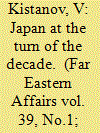

|
|
|
|
|
| Publication |
2011.
|
| Summary/Abstract |
After a half-century or more of almost single-party rule by the Liberal Democratic Party, the Democratic Party came to power in Japan in September 2009. The Japanese people had great hopes for the DPJ where revival of the country was concerned, but a little over a year after the Democrats' resounding victory it was clear that they were incapable of solving a number of long-standing social and economic problems, and were committing one grievous error after another in foreign policy. The author concludes that as the electorate's disappointment and dissatisfaction with the Democratic Party's actions grows, its prospects increasingly wane.
|
|
|
|
|
|
|
|
|
|
|
|
|
|
|
|
| 8 |
ID:
086684
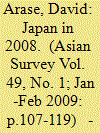

|
|
|
|
|
| Publication |
2009.
|
| Summary/Abstract |
Events in 2008 suggest that the Koizumi era is over and the Liberal Democratic Party will lose the lower house election that must be called before its current term expires in September 2009. The Democratic Party of Japan became the favorite to win the election and laid out the new domestic and foreign policy directions in which it will take Japan.
|
|
|
|
|
|
|
|
|
|
|
|
|
|
|
|
| 9 |
ID:
120180


|
|
|
|
|
| Publication |
2013.
|
| Summary/Abstract |
This article examines the impact of the changed domestic political environment in Japan and Taiwan in the second half of the 2000s, namely the arrival of administrations with a more moderate China policy, on their respective relations with Beijing and Washington. It seeks to find out the extent to which Japan under the Democratic Party of Japan (DPJ) and Taiwan under the Kuomintang (KMT) may have attempted a policy shift towards accommodation of China at the expense of their respective security ties with America. The article also examines how much impact upon security policy can be traced to the changes in domestic politics in the two cases. The discussion suggests that, irrespective of the altered domestic political situation, the concern that China's growing military power may adversely affect national interests has largely trumped the political will for seeking accommodation, more so in the Japanese case than in the Taiwanese case. While both Tokyo and Taipei have avoided deferring to Beijing's interests, each has sought to strike a delicate balance between engaging China and maintaining defense ties with the US.
|
|
|
|
|
|
|
|
|
|
|
|
|
|
|
|
| 10 |
ID:
091463
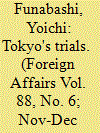

|
|
|
|
|
| Publication |
2009.
|
| Summary/Abstract |
The DPJ's rise to power is a historic opportunity for Japan to revise the constitution, loosen the bureaucracy's grip on policymaking, redistribute income, and improve relations with the rest of Asia. But the road will be long and tortuous.
|
|
|
|
|
|
|
|
|
|
|
|
|
|
|
|
|
|
|
|
|